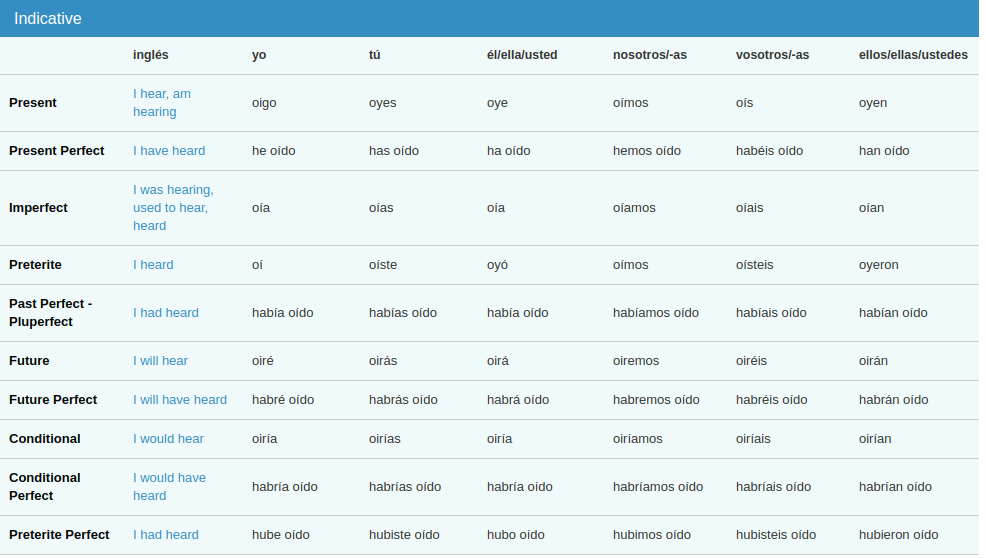On this Article you will learn “oir conjugation”, how to conjugate the irregular Spanish Language verb “oir” (to hear) in all about its tenses with your voir moods.
This common verb is highly irregular Talk about your favorite (and least favorite) sounds with the Spanish Language verb ‘oír.’ In it unit, you will learn its part of the conjugation in the present tense as well as the present subjunctive through plenty of real life voir examples.
What Do You Hear?
Definition: to hear
You’re probably hearing lots of different sounds right now, but if you’re paying attention to what you’re reading, you might not be aware of them. You might be hearing the traffic, a car horn or someone talking on the radio or TV, or if you’re lucky enough to be surrounded by nature, you might be hearing the birds singing or even the sound of a fountain or a river. In Spanish Language, we use the verb oír (pronounced: oh-EER), which means ‘to hear,’ to refer to the sounds we hear or perceive, as opposed to what we listen to.
Let’s look at out how to conjugate it verb in the present tense as well as the present subjunctive as well as how to use it adequately in context. Daniela as well as her friend Ana will help us with lots of examples.
Spanish Verb Conjugation – oír
Imp Notes: Sus formas irregulares: escucho, oigo, oiga, oigas,escucho, escucho, etc. Setera. Intervocalic i (cuando no se pronuncia)> y: oye, escucha, oyeron, escucha, oyendo, etcétera. Partículas pasadas: oreja. Mandato originalmente plural: escuchado. Las formas irregulares son azules

Use the quick table based format below to find the oir conjugation preterite you are all tenses the looking for quickly step by step information and easy with efficiently.
Oir conjugation List
- Present tense of Oír (indicative)
- Future tense of Oír (indicative)
- Imperfect tense of Oír (indicative)
- Preterite tense of Oír (indicative)
- Conditional tense of Oír (indicative)
- Present perfect tense of Oír (indicative)
- Future perfect tense of Oír (indicative)
- Past anterior tense of Oír (indicative)
- Pluperfect tense of Oír (indicative)
- Present subjunctive of Oír
- Imperfect subjunctive of Oír
- Future subjunctive of Oír
- Present perfect subjunctive of Oír
- Future perfect subjunctive of Oír
- Pluperfect subjunctive of Oír
- Participles of Oír
- Forms of the imperative of Oír
Present Indicative of Oír
| Subject Pronoun |
Present Indicative |
Pronunciation | Translation |
|---|---|---|---|
| yo | oigo | (OY-goh) | I hear |
| tú | oyes | (OH-yays) | you hear |
| él/ella usted |
oye | (OH-yay) | he/she hears – you (formal) hear |
| nosotros/ nosotras |
oímos | (oh-EE-mohs) | we hear |
| vosotros/ vosotras |
oís | (oh-EES) | you all hear |
| ellos/ellas ustedes |
oyen | (OH-yayn) | they hear you all hear |
Additional Information for conjugation:
| Is it irregular? | Is it reflexive? | What is the gerund? | What is the past participle? |
|---|---|---|---|
| Yes | No | oyendo | oído |
Conjugation Chart
SPANISH TENSE NAME: Pretérito MODE: Indicative
| Personal Pronoun | Conjugation |
|---|---|
| Yo | oí |
| Tu | oíste |
| El/Ella | oyó |
| Nosotros | oímos |
| Vosotros | oísteis |
| Ellos/Ellas | oyeron |
Web Programming Tutorials Example with Demo
Read :
Summary
You can also read about AngularJS, ASP.NET, VueJs, PHP.
I hope you get an idea about past tense spanish conjugation.
I would like to have feedback on my infinityknow.com blog.
Your valuable feedback, question, or comments about this article are always welcome.
If you enjoyed and liked this post, don’t forget to share.